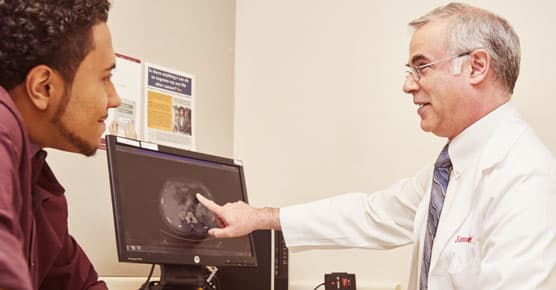Hereditary Diffuse Gastric Cancer and CDH1 Gene Mutations
In some cases, an inherited syndrome contributes to an increased risk of developing stomach cancer, also known as gastric cancer. Hereditary diffuse gastric cancer (HDGC) syndrome significantly increases the risk for diffuse gastric cancer, as well as lobular breast cancer. Carrying a mutation in the CDH1 gene raises the risk of diffuse gastric cancer as much as 70% for men and 56% for women, compared to a <1% chance in people without a CDH1 mutation.
Stomach cancer is one of the most common types of cancers in Southeast Asia, Central and South America. However, most cases of gastric cancer are not the diffuse type. An estimated 1 to 3% of gastric cancer cases are diffuse.
Once an inherited CDH1 gene variant is detected in a person, a multidisciplinary team of experts comprised of surgeons, gastroenterologists, genetic counselors, nutritionists and pathologists, such as the team at the UChicago Medicine Gastrointestinal Cancer Risk and Prevention Clinic, can provide personalized recommendations. These options vary greatly by patient, but often include:
- Endoscopic surveillance with random biopsies. This method of surveillance involves being sedated and having samples of the stomach lining biopsied to attempt to identify cancerous cells. However, this method is like “looking for a needle in a haystack” due to the diffuse nature of the cancer. It can be difficult to identify these cells by taking biopsies because there are usually no visual differences of the stomach that can be seen with a scope to help target the biopsies. Therefore, the best way we have to reduce the risk of gastric cancer in CDH1 carriers is to have surgery.
- Surgery. If you have an increased cancer risk based on criteria met (a strong family history and CDH1 gene variant), your doctor may recommend a prophylactic (preventive) total gastrectomy. During a total gastrectomy, the entire stomach is removed and a part of the small bowel is then extended straight up to meet the esophagus. The cut end of the duodenum is then reconnected to the small bowel.
Life after surgery is very manageable, and while not having a stomach may seem daunting, over time the body will adjust to the "new normal." Your care team will discuss post-surgery recommendations with you, such as nutritional needs. - Breast cancer surveillance. Managing your breast cancer risk through breast surveillance is important for women in HDGC families. It is recommended that women affected by a CDH1 gene mutation meet with a breast oncologist or breast surgeon for yearly clinical breast exams and to talk about screening for lobular breast cancer. Beginning at age 30, active surveillance may include screening breast MRIs, in addition to annual mammograms and medication therapy. Some patients may even consider preventative mastectomy as an option, but this is not routinely recommended for CDH1 mutation carriers.

GI Cancer Risk and Prevention
The Gastrointestinal Cancer Risk and Prevention Clinic cares for individuals who have an increased risk of gastrointestinal cancer due to family history, medical and genetic factors, and more.
Learn about GI cancer risk and preventionStomach removal eliminates risk of cancer for patient with CDH1 mutation


Cancer Care Second Opinions
Request a second opinion from UChicago Medicine experts in cancer care.

Participate in a Clinical Trial
Find a stomach cancer clinical trial at UChicago Medicine.

Why Choose Us for Cancer Surgery?
Our surgeons offer sophisticated techniques, including minimally invasive and robotic options, to treat cancer.
